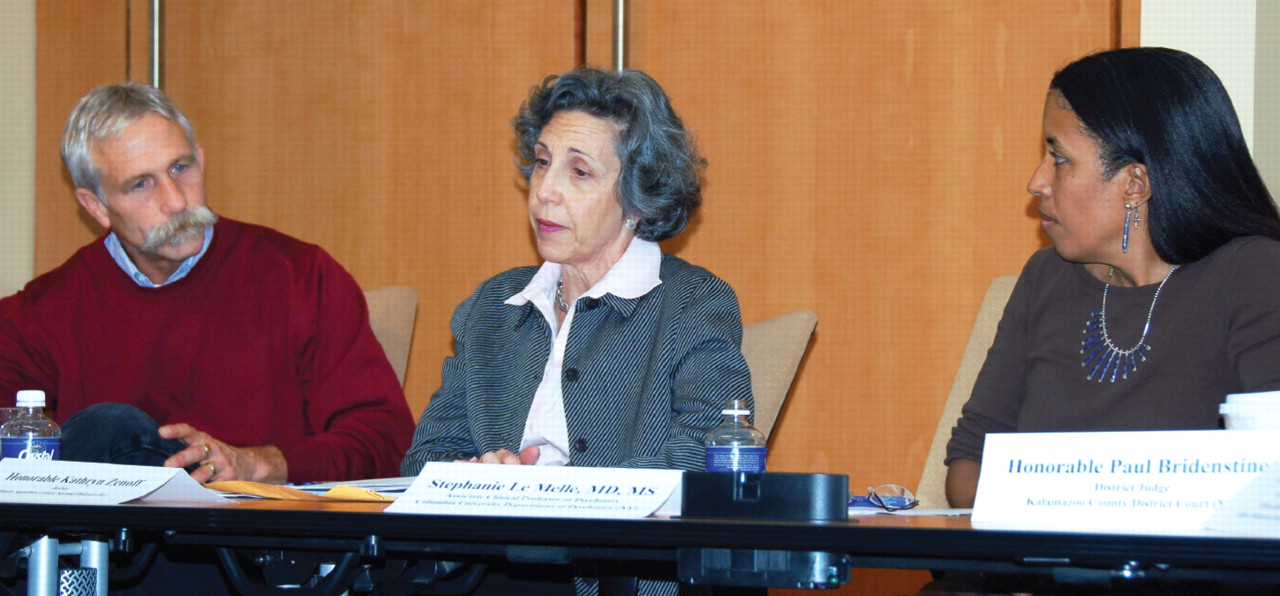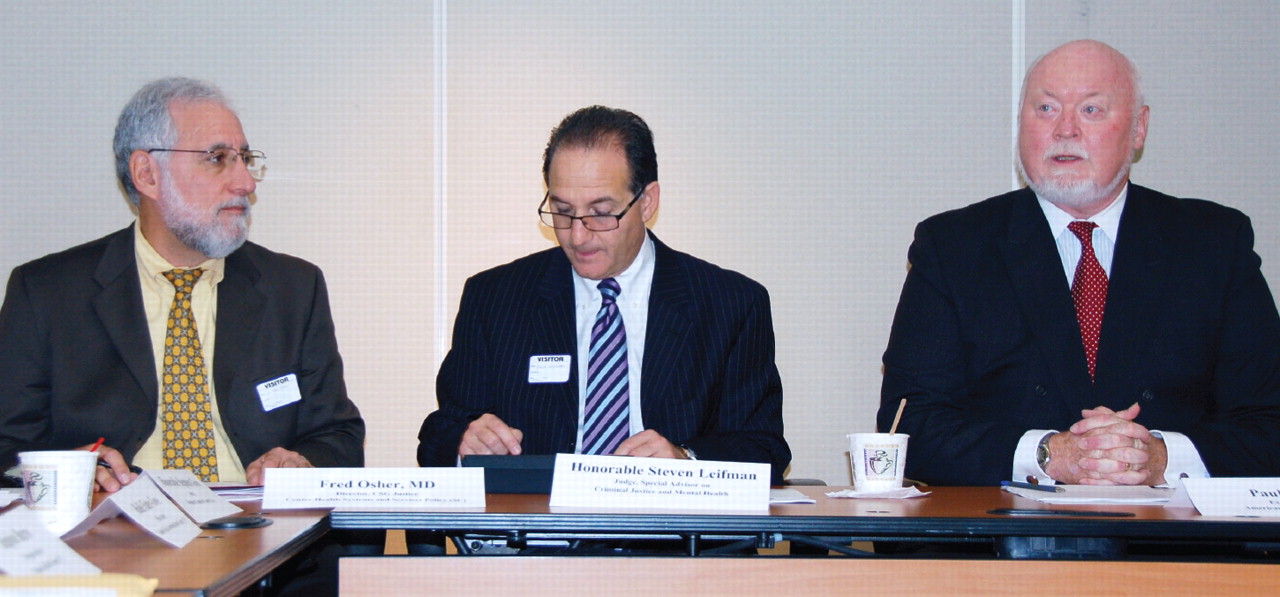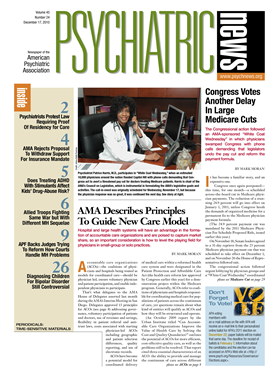Kathryn Zenoff, an Illinois appellate court judge, has noticed a growing trend throughout her judicial career: the same small group of defendants would repeatedly appear before her, usually on misdemeanor criminal charges, be convicted, and then sentenced for short periods to the local jail.
These defendants were not career criminals, she realized, but part of a growing number of people with untreated mental illness who were pulled into the criminal-justice system when they suffered a psychiatric crisis.
“I've seen this issue in my career as a judge, up close and personal,” Zenoff told Psychiatric News.
She and other judges nationwide took action, sometimes individually and recently in partnership, to address the problem through reforms of their local or state criminal-justice and health systems that aimed to reduce incarceration rates while increasing treatment for people with mental illness.
And now the American Psychiatric Foundation (APF) has joined in these judges' mission. In July the APF launched a partnership with the Judges' Leadership Initiative (JLI)—a group that has provided technical support since 2004 to judges, like Zenoff, seeking to change jurisdictions' approaches to people whose untreated mental illness escalated into a psychiatric crisis, resulting in their arrest. The Judges Leadership Initiative and Psychiatric Leadership Program is supported by a charitable contribution from Janssen Pharmaceuticals.
The partnership held its inaugural meeting October 26 at APA headquarters in Arlington, Va., The focus of the meeting was the creation and dissemination of guides for judges to help them recognize arrestees with untreated mental illness and understand the treatments and local resources available for this population.
Judges “have moved forward in their communities and developed a range of programming,” said Fred Osher, M.D., director of health systems and services policy at the Council of State Governments Justice Center (CSGJC), who is helping to lead the partnership, in an interview with Psychiatric News before the meeting. But “they have not been at the table with the psychiatric leaders in their communities, and [theirs] has been a missing voice in too many of the communications” about the problem of the criminalization of mental illness. “At the end of the day this is all about collaboration.”
More Judges Need to Participate
Steven Leifman, an associate administrative judge for Miami-Dade County and a board member of APF, likened the type of training needed by state judges to the approach used when Crisis Intervention Teams (CIT) are created in police departments. CIT police units receive specialized training to guide their interactions with people experiencing a psychiatric crisis, and all of the members of a police force with a CIT unit also receive generalized training on mental illness.
While specialized mental health courts are a key part of the answer, he said, mental illness is so pervasive among criminal defendants that all judges need training to at least recognize it and know what alternatives are available.
“We're kind of driving blindly sometimes, so it's a good thing to collaborate with the psychiatric community,” Leifman told Psychiatric News at the meeting.
Evelyn Stratton, a justice of the Ohio Supreme Court, told Psychiatric News at the meeting that the initiative's success will depend on producing information and outreach that interests all judges, not just those who are specialists or already have an interest in mental health issues.
The APF partnership adds to a growing effort to address untreated mental illness among criminal defendants—mental health courts have increased from a handful in the mid-1990s to more than 500 today. However, the problem of how best to deal with mentally ill defendants remains daunting.
For example, approximately 16.9 percent of inmates in U.S. jails and prisons have a serious mental illness, while only an estimated 5.4 percent of the general U.S. population have such a condition, according to a 2009 CSGJC study.
Such high rates of incarceration of people with mental illness stem largely from the overreliance of states and localities on the justice system to accommodate people with mental illness, while underfunding their public mental health care system, according to the judges and psychiatrists at the meeting. That funding imbalance also is evident in the May finding by the Treatment Advocacy Center that three times as many people with serious mental illness are in jails and prisons than are in hospitals.
Ironically, prison is the one place where people are constitutionally guaranteed to receive needed mental health care. In practice, such care often is elusive in overcrowded and underfunded prisons, according to psychiatrists involved in the partnership. Avoiding the need for incarceration by using clinically effective community treatment options and steering untreated people toward mental health care is another goal of the new partnership.
Judges also can help address the dearth of quality mental health care in their communities by not only acting as influential supporters for expanded mental health facilities and programs but by acting as advocates for the specific types of programs that their psychiatrist partners have identified as having demonstrated efficacy.
“Judges are among the most respected members of their communities, and they are assumed to not have any [financial or political] interests in the outcome,” Osher said at the meeting. “That's why there are not any better advocates of [expanded] mental health services” than these jurists.
Grant Sparked Changes
Such judicial advocacy on behalf of people with mental illness in Miami-Dade County began 10 years ago when local judges used a grant from the National GAINS Center of the Substance Abuse and Mental Health Services Administration to “map out” how the criminal-justice system and the mental health system interacted (Psychiatric News, November 19).
“They didn't” was the chief finding of that initiative, Leifman said at the meeting.
What the Miami-Dade judges learned led to a judges' partnership that urged local elected officials to enact systemic reforms, such as mental illness awareness training for local police, a jail-diversion program for people with mental illness, and passage of a $22 million bond issue to build a first-of-its-kind combined jail, treatment, and reintegration housing facility. The results of those and related efforts include sustained drops in both misdemeanor and felony recidivism rates in recent years, Leifman said.
“The goal of the court should not be to develop a system of mental health care within the justice system,” Leifman said. “We should be aiming to prevent people from entering that system in the first place.”


